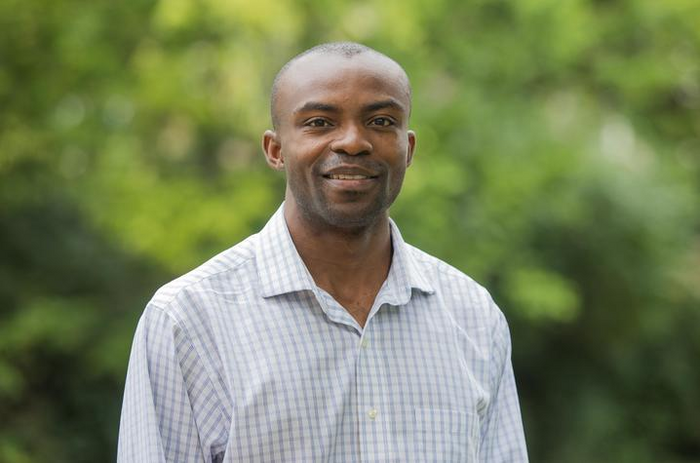LEXINGTON, Ky. (Oct. 26, 2022) — A University of Kentucky Markey Cancer Center researcher’s team developed new chemical compounds that show promise as a potential anticancer therapy to treat aggressive tumors.

Credit: University of Kentucky
LEXINGTON, Ky. (Oct. 26, 2022) — A University of Kentucky Markey Cancer Center researcher’s team developed new chemical compounds that show promise as a potential anticancer therapy to treat aggressive tumors.
The study led by Samuel G. Awuah, Ph.D., was published in Chemical Communications with Adedamola Arojojoye, a graduate student in Awuah’s lab as the paper’s first author.
The new gold-derived compounds created by Awuah’s lab were toxic to cancer cells but well-tolerated by mice, giving them potential in the development of new cancer drugs that could make it to the clinic.
Many metal-based therapies have proven to be effective against cancer, with platinum-based drugs a first line chemotherapy for testicular, bladder, lung, colon and ovarian cancers. Some metal-based compounds, like gold(III), have promise as anticancer agents, but lack the stability needed to continue therapeutic development.
Awuah’s lab synthesized a new class of gold(III), which had a different structure that was more tolerant to therapeutic use.
In the lab, the new chiral gold(III) compounds were studied on a panel of cancer cell lines to test their effectiveness and understand how they attack cancer cells.
The compounds showed anticancer activity against aggressive triple negative breast cancer cells. They also possessed a new mechanism that caused the cells’ mitochondria to dysfunction.
Awuah says developing drugs that cause mitochondria dysfunction deprive cancer cells of energy and is a new relevant strategy to inhibit cancer growth that would be useful in combination with existing therapies.
“Continuing to develop gold-based compounds has the potential to generate new mechanisms of drug action and understanding how they alter cancer cells has significant implications in drug design and is of clinical relevance,” Awuah said.
Awuah is an assistant professor in the College of Arts and Sciences’ Department of Chemistry and holds a joint appointment in the College of Pharmacy’s Department of Pharmaceutical Sciences. His lab focuses on developing new methods to create chemical tools that interrogate complex biological processes as therapeutics for several diseases, including cancer.
Research reported in this publication was supported by the National Cancer Institute of the National Institutes of Health under Award Number R01CA258421. The content is solely the responsibility of the authors and does not necessarily represent the official views of the National Institutes of Health.
The University of Kentucky is increasingly the first choice for students, faculty and staff to pursue their passions and their professional goals. In the last two years, Forbes has named UK among the best employers for diversity, and INSIGHT into Diversity recognized us as a Diversity Champion four years running. UK is ranked among the top 30 campuses in the nation for LGBTQ* inclusion and safety. UK has been judged a “Great College to Work for” three years in a row, and UK is among only 22 universities in the country on Forbes’ list of “America’s Best Employers.” We are ranked among the top 10 percent of public institutions for research expenditures — a tangible symbol of our breadth and depth as a university focused on discovery that changes lives and communities. And our patients know and appreciate the fact that UK HealthCare has been named the state’s top hospital for five straight years. Accolades and honors are great. But they are more important for what they represent: the idea that creating a community of belonging and commitment to excellence is how we honor our mission to be not simply the University of Kentucky, but the University for Kentucky.
Journal
Chemical Communications



